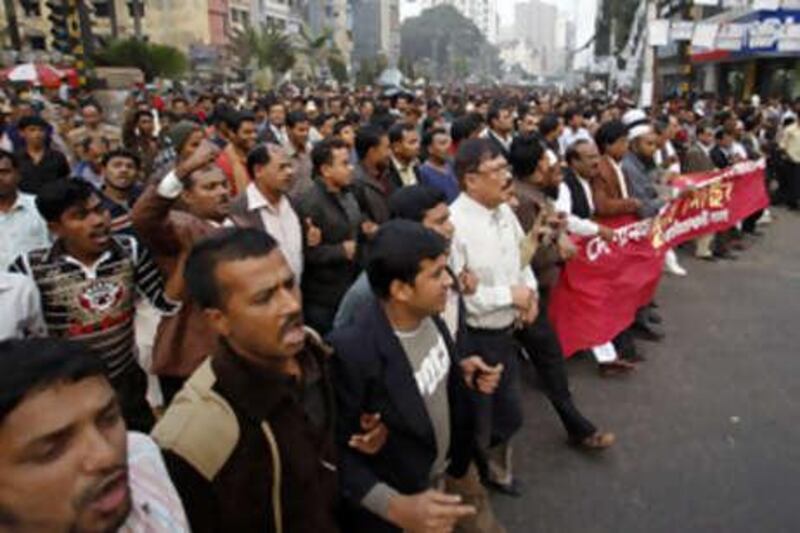KOLKATA // As Bangladesh prepares to hold its first election in seven years on Monday, Khaleda Zia, a former prime minister, urged people to vote for the four-party alliance led by her Bangladesh Nationalist Party [BNP] if they wanted to "save Islam". "Save the country and Islam by voting for our alliance, and don't cast your vote for those who defamed the religion," Mrs Zia said this week during a rally at a madrasa in the eastern Bangladesh city of Sylhet.
"The country will be saved if you vote for our alliance. On the other hand, the country's independence and sovereignty will be jeopardised if you vote for those who want to install a puppet government and sell the country away," she said. Attacking her political rivals, Mrs Zia, who served as prime minister twice (from 1991 to 1996 and 2001-2006), added that "some vested interests who are guided by foreign powers" are trying to wrongly brand Bangladesh a land of Islamic militants.
Mrs Zia's charges have been refuted as "baseless" by Sheikh Hasina Wajed, also a former prime minister and a candidate of Maha Jot or Grand Alliance, which is led by her party, the Awami League. Sheikh Hasina said that during the BNP-Jamaat regime the government had indulged in mass-scale corruption, plundered the country's wealth and allowed the widespread growth of religious extremist groups. "Everyone knows how she was caught in corruption cases and siphoned the nation's assets out of the country. Such a corrupt person should not raise the issue of religion," said Sheikh Hasina, whose rivalry with Mrs Zia is internationally known. The pair have been labelled "battling begums".
Both Mrs Zia and Sheikh Hasina have served time in jail on corruption charges. Many of Mrs Zia's political associates as well as her two sons have also been jailed. Hussain Mohammad Ershad, chairman of Jatiya Party, which is an ally of Maha Jot, accused Mrs Zia of telling a "big lie", calling the accusations against Sheikh Hasina "ridiculous". He said Mrs Zia was more interested in benefiting her family and herself than in helping average citizens.
"Who disgraced the country by rearing up militant activists in the country? Who created Jama'atul Mujahideen Bangladesh [a banned Islamist outfit]? Who smuggled money from multinational companies in kickbacks out of the country?" Mr Ershad said at a rally this week. "If BNP comes to power, Bangladesh will be ravaged by corruption again and the country will turn to a den of religious extremism? For political interests, they are making false propaganda about our alliance, branding us anti-Muslims and anti-Islam.
"They have told people that [if Sheikh Hasina is elected] Muslims would not be allowed to sport beards, sacrifice animals, or pray five times a day and the call to prayer would not be heard from any mosque. These are irresponsible, false and misleading statements." Political analysts, most of whom believe that Maha Jot will be able to form a government after Monday's vote, said BNP-Jamaat alliance leaders are concerned about their future should they lose the election.
"Everyone has been corrupt here. Politicians in power, government officials and even officers of police were corrupt," said Makdum Bin Yusuf, the chief executive of a Dhaka-based marketing agency. "It is difficult to get a totally honest politician in Bangladesh. Yet people will vote for a party which is likely to be less corrupt. On this count Sheikh Hasina's alliance is ahead of its rival in this race for forming a government. I don't think there is anyone in Bangladesh who really believes that Maha Jot is anti-Muslim or anti-Islam. It's a ridiculous allegation."
The country's military-backed interim government has promised the fairest and most peaceful election in the nation's history. The last time Bangladesh prepared for elections, in 2006, months of strikes and street violence forced the army to step in. aziz@thenational.ae





